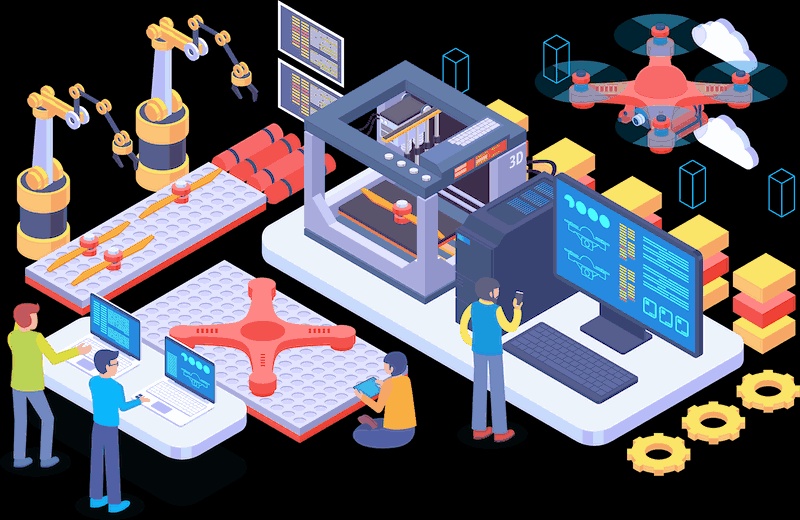Training plays a pivotal role in the manufacturing industry, making learning matter, fostering a culture of continuous improvement and linking learning with performance to ensure that workforce skills align with evolving industry demands. Through this article, we will delve into the critical importance of training in enhancing efficiency and productivity in manufacturing. Additionally, we will explore the transformative potential of an AI-powered LMS tailored for the manufacturing sector.
The Significance of Employee Training in Manufacturing
Manufacturing environments are dynamic, with technological advancements and evolving processes being the norm rather than the exception. In such a landscape, training becomes indispensable for workers to adapt to new tools, techniques, and safety protocols. A well-trained workforce is not only more adept at their tasks but also contributes significantly to operational efficiency, product quality, and overall workplace safety.
The Role of LMS in Manufacturing Training
An LMS designed specifically for the manufacturing sector caters to the unique needs and challenges of this industry. These systems provide a centralized platform for organizing, delivering, and tracking training programs.
- Centralized Training Management
A robust LMS for the manufacturing industry centralizes the management of training programs. This ensures that all employees have access to consistent and up-to-date training materials, fostering a standardized skill set across the organization.
- Scalability and Flexibility
In a dynamic manufacturing environment, scalability and flexibility are paramount. An LMS allows for the seamless integration of new training modules as processes evolve, ensuring that workforce skills are always aligned with industry requirements.
- Real-time Progress Tracking
AI-powered LMS solutions enable real-time tracking of employee progress. Supervisors can easily monitor who has completed specific training modules, identify areas that may require additional focus, and ensure that all employees are adequately trained.
- Customized Learning Paths
Tailoring training programs to individual roles and skill levels is crucial in this sector. An LMS for the manufacturing industry allows for the creation of customized learning paths, ensuring that employees receive relevant training that directly contributes to their job responsibilities.
- Interactive Simulations and Virtual Training
An effective LMS for the manufacturing industry incorporates interactive simulations and virtual training modules. These tools provide hands-on experience in a virtual environment, allowing employees to practice tasks and procedures without the risk associated with on-the-job training. This not only enhances skill acquisition but also contributes to a safer workplace by reducing the likelihood of accidents during the learning process.
- Compliance Management and Reporting
Compliance with industry regulations and standards is paramount in manufacturing. A specialized LMS offers robust compliance management features, allowing organizations to track and report on employee certifications and adherence to safety protocols. This not only ensures regulatory compliance but also provides a comprehensive overview of the workforce's preparedness for audits and inspections.
Benefits of an AI-powered LMS for the Manufacturing Industry
- Adaptive Learning Algorithms
AI-powered LMS systems utilize adaptive learning algorithms to personalize the training experience. These systems analyze individual learner performance and adjust the difficulty and content of modules accordingly, optimizing the learning curve.
- Predictive Analytics for Skills Gap Identification
AI-driven analytics in an LMS can predict potential skills gaps within the workforce. By identifying these gaps proactively, manufacturers can implement targeted training programs to address specific areas, reducing the risk of operational disruptions.
- Automated Content Curation
AI-powered LMS streamlines content curation by analyzing the relevance and effectiveness of training materials. This ensures that employees receive the most current and pertinent information, eliminating outdated content that may hinder rather than enhance their skills.
- Natural Language Processing (NLP) for Enhanced Interactivity
AI-powered LMS leverage NLP to enhance interactivity in training modules. This allows learners to engage in conversations with virtual instructors, ask questions, and receive feedback in a more conversational manner. The incorporation of NLP not only makes the learning experience more engaging but also facilitates better retention of complex information.
- Adaptive Assessment and Feedback Mechanisms
AI-powered LMS systems go beyond traditional assessments by incorporating adaptive techniques. These systems analyze learner responses in real-time, adapting the difficulty and type of questions based on individual performance. Additionally, they provide instant feedback, guiding learners on areas that need improvement and reinforcing knowledge gaps, creating a more personalized and effective learning journey.
Conclusion
The manufacturing industry's pursuit of efficiency and productivity hinges on the effectiveness of its training programs. Implementing an AI-powered LMS designed for the unique challenges of manufacturing can significantly elevate training outcomes. These innovative solutions not only streamline training operations but also contribute to a more agile, skilled, and adaptable workforce ready to meet the demands of a rapidly evolving industry.
By embracing the potential of LMS for the manufacturing industry and harnessing the capabilities of AI, organizations can create a learning ecosystem that not only meets current challenges but also prepares the workforce for the challenges of tomorrow.


No comments yet